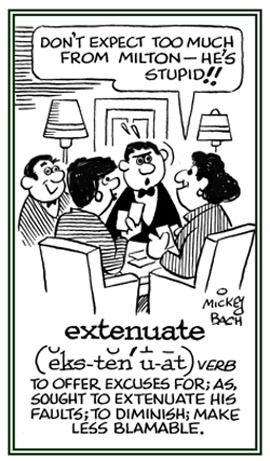You searched for:
“extenuate”
extenuate (verb), extenuates; extenuated; extenuating
1. To make a mistake or wrongdoing seem less serious than it first appeared to be: To extenuate something by representing it as being less blameworthy or to make excuses for doing it.
2. To cause something; such as, a fault, offense, etc. to be less significant: Henry was not fined by the police for speeding because he had to get to the hospital as quickly as possible; so, his action extenuated or justified the reason for his driving so fast.

© ALL rights are reserved.

© ALL rights are reserved.
Go to this Word A Day Revisited Index
2. To cause something; such as, a fault, offense, etc. to be less significant: Henry was not fined by the police for speeding because he had to get to the hospital as quickly as possible; so, his action extenuated or justified the reason for his driving so fast.
Extenuate should be used about a situation that is minimized, not that of the person.
3. Etymology: from Latin extenuat-, past participle stem of extenuare, "to lessen" from ex-, "out" + tenuare, "to make thin, to diminish, to lessen"; from tenuis, "thin".

Go to this Word A Day Revisited Index
so you can see more of Mickey Bach's cartoons.
This entry is located in the following unit:
tend-, tendo-, ten-, teno-, tenot-, tenonto-, tens-, tent-, -tend, -tension, -tent, -tense, -tensive, -tentious
(page 3)
extenuate, palliate (PAL ee ate"), gloss over, whitewash (verb forms)
These words all mean to make something seem less wrong, evil, blameworthy, etc.
- Extenuate suggests the effort to lessen, or to decrease blame that has been incurred by an offense, while palliate implies concealment, to make less severe or intense, as of the incriminating facts or the gravity of their consequences.
- Gloss over stresses the disguising or misrepresentation of incriminating facts; such as, to gloss over a mediocre academic record.
- To whitewash is to represent by completely false information or a dishonest judgment: "The accused man went free, whitewashed by a misguided board of investigation."
To extenuate past neglect by present concern; to palliate the errors in a book:
"Starvation may serve to extenuate an instance of theft."
"A doting parent may seek to palliate the excesses of an errant son."
"A doting parent may seek to palliate the excesses of an errant son."
This entry is located in the following unit:
tend-, tendo-, ten-, teno-, tenot-, tenonto-, tens-, tent-, -tend, -tension, -tent, -tense, -tensive, -tentious
(page 4)
